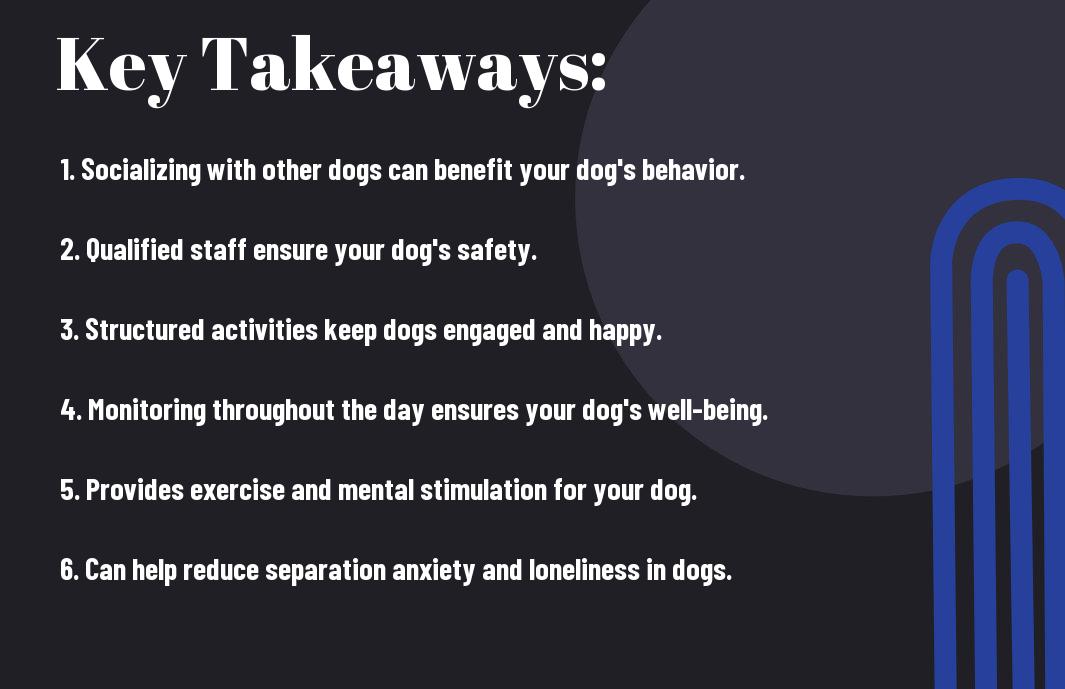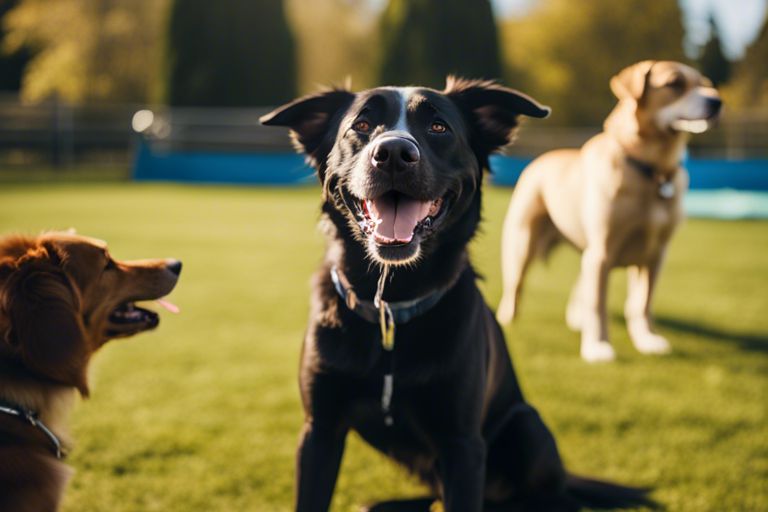With the increasing popularity of doggy daycares, you may be wondering if this option is right for your furry friend. As Dr. Temple Grandin emphasizes, understanding your dog’s behavior and welfare is crucial in making this decision. So, how can you ensure that your dog will be okay at doggy daycare? Let’s probe into the important factors to consider when entrusting your beloved companion to a daycare facility.
Key Takeaways:
- Socialization: Doggy daycare can provide a great opportunity for your dog to socialize with other dogs, helping to improve their social skills and decrease anxiety.
- Supervision: Make sure the daycare facility has trained staff who can provide proper supervision and care to ensure your dog’s safety and well-being throughout the day.
- Health and Safety: Check that the daycare requires all dogs to be up-to-date on vaccinations to prevent the spread of diseases, and inquire about their emergency procedures in case of any health issues or accidents.
What to Expect at Doggy Daycare
A visit to a doggy daycare can be a beneficial experience for your furry friend. If you are considering enrolling your dog in daycare, it’s natural to have questions about what to expect. To help you gain a better understanding of what goes on at these facilities, consider reading The Truth About Dog Daycare.
Socialization Benefits
One of the key benefits of doggy daycare is socialization. Dogs are pack animals by nature, and interacting with other dogs in a supervised setting can help improve their social skills. Your pup will have the opportunity to learn proper canine communication, develop confidence, and burn off excess energy through play.
Exercise and Playtime
On top of socialization, exercise and playtime are imperative components of a doggy daycare. These activities can vary from structured group games to individual play sessions, depending on the facility. Regular exercise not only keeps your dog physically fit but also helps maintain their mental well-being. It can prevent boredom, reduce destructive behaviors, and improve overall obedience.
To ensure your dog gets the most out of daycare, inquire about the types of activities offered and how the facility manages playtime. This way, you can rest assured that your furry companion is engaging in enriching experiences that cater to their specific needs and preferences.
Assessing Your Dog’s Suitability
Even before sending your dog to a doggy daycare, you should assess if it will be a good fit for them. Consider various factors such as breed, size, age, health, temperament, and energy level.
Breed and Size Considerations
For breed and size considerations, it’s necessary to think about your dog’s specific needs and tendencies. Some breeds may fare better in a social environment like a daycare, while others may prefer a quieter setting. Additionally, the size of your dog can play a role in how they interact with other dogs, so it’s crucial to ensure they will be comfortable in a group setting.
Age and Health Factors
For age and health factors, consider if your dog is old enough and healthy enough to participate in daycare activities. Puppies may have different needs than senior dogs, and those with underlying health conditions may require special attention. It’s important to discuss any concerns with the daycare staff to ensure your dog’s well-being.
- After considering these factors, you can make an informed decision about whether doggy daycare is the right choice for your furry friend.
Breed: Some breeds may be more prone to certain health issues or may have specific behavioral tendencies that could impact their experience at daycare. Consult with your vet and the daycare staff to determine if your dog’s breed and health status make them a good candidate for daycare activities.
- After considering these factors, you can make an informed decision about whether doggy daycare is the right choice for your furry friend.
Temperament and Energy Level
With temperament and energy level, think about how your dog typically interacts with others and their activity levels. Some dogs may thrive in a high-energy daycare environment, while others may be more suited to a calmer setting. Matching your dog’s temperament and energy level to the daycare’s atmosphere can help ensure they have a positive experience.
Understanding your dog’s unique needs and characteristics is crucial in determining if they will be okay at doggy daycare. By carefully assessing factors like breed, size, age, health, temperament, and energy level, you can make an informed decision that prioritizes your dog’s comfort and well-being.
Preparing Your Dog for Daycare
Your dog’s experience at doggy daycare can be greatly improved with some preparation beforehand. Here are some tips to help your furry friend adjust to this new environment:
Basic Obedience Training
For a smooth transition to daycare, ensure your dog has basic obedience training. Commands such as sit, stay, and come can help your dog listen to daycare staff and interact well with other dogs.
Socialization with Other Dogs
Socialization is key for your dog to feel comfortable around other dogs at daycare. Arrange playdates with other dogs to gauge your dog’s response and help them feel more at ease when surrounded by new canine friends.
The more familiar your dog is with various dog breeds and temperaments, the more confident and relaxed they will be in a bustling daycare setting.
Acclimating to Noises and Environments
On the days leading up to daycare, expose your dog to different noises and environments to prevent sensory overload. This can include playing recordings of common daycare sounds or taking your dog for walks in busy areas to get them accustomed to various stimuli.
With gradual exposure, your dog will be better prepared to handle the hustle and bustle of a daycare setting without feeling overwhelmed.
Red Flags to Watch Out for
Fear or Aggression
Watch out for any signs of fear or aggression in your dog while at doggy daycare. If your dog seems anxious, stressed, or exhibits any aggressive behaviors towards other dogs or staff members, it may not be the right environment for them. It’s crucial to ensure that your dog is comfortable and happy while in daycare.
Health Concerns
Fear not; most doggy daycares have stringent health and safety protocols in place to prevent the spread of illnesses. They often require proof of vaccinations to protect all dogs in their care. Additionally, they usually have regular cleaning schedules to maintain a hygienic environment for all furry guests.
It’s crucial for your dog to be up to date on all their vaccinations before attending daycare to keep them and other dogs safe. Keeping an eye on your dog’s health is vital to catch any issues early on.
Escape Artists
Any signs of your dog trying to escape can be a red flag at doggy daycare. If your dog is constantly trying to find ways out or shows a desire to run away, it might indicate that they are uncomfortable or unhappy in that environment. It’s crucial to address this behavior promptly to ensure your dog’s well-being.
Understanding the reasons behind your dog’s escape attempts is crucial. It could be due to separation anxiety, feeling overwhelmed, or simply wanting to go back home. Addressing these underlying issues is vital to create a positive experience for your dog at daycare.
Choosing the Right Doggy Daycare
Not all doggy daycares are created equal, so it’s important to choose the right one for your furry friend. Here are some factors to consider when selecting a doggy daycare:
Research and Reputation
Right from the start, you should research different doggy daycares in your area and look into their reputation. Check online reviews, ask for recommendations from other pet owners, and visit the facilities in person. A reputable daycare will have a clean and safe environment for your dog to play and socialize in.
Staff-to-Dog Ratio and Qualifications
Ratio Staff-to-dog ratio is crucial in ensuring your dog receives proper care and attention throughout the day. Make sure the daycare has enough staff members to supervise the dogs and that they are trained in handling various breeds and behaviors. Qualified and experienced staff will be able to manage any situations that may arise and ensure the safety of all the dogs in their care.
Daycare It’s necessary to ask about the qualifications of the staff at the daycare. They should have a good understanding of dog behavior, be trained in basic first aid, and know how to respond to emergencies. This will give you peace of mind knowing that your dog is in capable hands while at daycare.
Facility Safety and Cleanliness
An important aspect to consider is the safety and cleanliness of the daycare facility. Look for a daycare that has secure fencing, separate play areas for different sizes or temperament of dogs, and proper ventilation to ensure good air quality. A clean facility will reduce the risk of your dog getting sick and provide a healthy environment for them to play and interact with other dogs.
This Choosing a daycare that prioritizes safety and cleanliness will help ensure that your dog has a positive experience and stays healthy during their time at daycare. Pay attention to the overall cleanliness of the facility, including play areas, rest areas, and water bowls, to make sure that your dog will be well taken care of.
Monitoring Your Dog’s Progress
After leaving your dog at doggy daycare, it’s vital to monitor their progress to ensure they are comfortable and happy during their stay. By keeping an eye on how they are doing, you can address any issues promptly and make adjustments as needed.
Regular Updates from Staff
On a regular basis, the daycare staff should provide you with updates on how your dog is fitting in. These updates can include information on their eating habits, playtime behavior, and interactions with other dogs. This communication helps you stay informed and reassured about your dog’s well-being while they are away from you.
Observing Behavior and Body Language
Behavior
The behavior and body language of your dog can tell you a lot about how they are feeling at daycare. Pay attention to signs of stress, such as pacing, excessive panting, or avoidance of other dogs. Conversely, if your dog is relaxed, playing joyfully, and seeking interaction, these are positive indicators that they are enjoying their time at daycare.
The staff at the daycare center should also be trained to recognize these signs and intervene if necessary to ensure your dog’s well-being. By observing your dog’s behavior and body language, you can gain valuable insights into their experience at daycare and address any concerns promptly.
Addressing Any Concerns
Dogs
It’s important to address any concerns you may have about your dog’s well-being at daycare. If you notice any changes in behavior or have specific worries, don’t hesitate to discuss them with the staff. They should be receptive to your feedback and willing to work with you to make sure your dog is happy and comfortable during their stay.
It’s crucial to remember that every dog is unique, and what works for one may not work for another. By addressing any concerns promptly and effectively, you can help create a positive and enriching experience for your furry friend at doggy daycare.
Conclusion
Presently, you are probably feeling a mix of excitement and nerves about sending your dog to daycare. Bear in mind, dogs are social creatures and typically enjoy the company of other dogs. With the right daycare facility that provides proper supervision, structured activities, and a safe environment, your dog is likely to have a great time socializing and burning off energy while you are at work or busy.
It’s important to do your research, visit the facility beforehand, and ask questions to ensure that your furry friend will be in good hands. Trust your instincts and observe how your dog reacts to the daycare environment. With the right preparation and communication with the staff, your dog is likely to thrive at daycare and come home happily exhausted each day.
FAQ
Q: What is doggy daycare?
A: Doggy daycare is a facility where dogs are cared for during the day while their owners are at work or otherwise occupied. It provides socialization, exercise, and mental stimulation for dogs in a safe and supervised environment.
Q: Will my dog be safe at doggy daycare?
A: Doggy daycares prioritize the safety and well-being of all dogs in their care. They have trained staff members who monitor the dogs, separate them based on size and temperament, and ensure a secure environment to prevent any accidents or conflicts.
Q: How will my dog benefit from attending doggy daycare?
A: Doggy daycare offers numerous benefits for dogs, including socialization with other dogs, increased exercise through playtime, mental stimulation from various activities, and relief from boredom and loneliness that can lead to destructive behaviors at home.
Q: What should I look for in a good doggy daycare facility?
A: A good doggy daycare facility should have a clean and safe environment, trained staff members who are attentive to the dogs’ needs, structured activities throughout the day, a proper staff-to-dog ratio, and clear communication with pet owners about their dog’s behavior and well-being.
Q: How can I help my dog adjust to doggy daycare?
A: To help your dog adjust to doggy daycare, start with short visits to familiarize them with the environment and gradually increase the time spent there. Bring your dog’s favorite toys or blankets to provide comfort, and maintain a positive attitude to reassure them that it’s a fun place to be.




